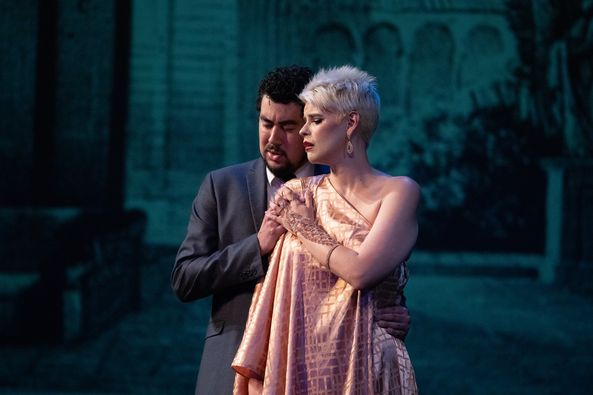Mattia Venni and Teresa Castillo
(Photo by Steve Pisano)
Last night we reviewed Teatro Nuovo's presentation of Donizetti's tragedy Poliuto; this was well matched with a sparkling comedy by I Fratelli Ricci (Federico and Luigi) entitled Crispino e la Comare with a libretto written by fellow Venetian Francesco Maria Piave. Who would have suspected that the librettist of such serious works as Ernani, Attila, Rigoletto, La traviata, and Simon Boccanegra would show himself to be a master of crowd pleasing comedy.
In another informative pre-opera lecture by Will Crutchfield, General and Artistic Director of Teatro Nuovo, we learned why multitudes of charming Italian comedies, so popular in their time, have become nearly lost. In the second half of the 19th c. Giuseppi Verdi's operas filled the major opera houses. Meanwhile, a legion of presently unknown composers delighted their public in the smaller houses with frothy works featuring silly plots and gorgeous Bel Canto music. In our imagination we see throngs of locals, seeking an entertaining evening, flocking to these venues for a hearty laugh and a head full of tunes on their way home. During the performance we allowed ourself the same pleasures.
The story concerns an impoverished cobbler who, through the good graces of a fairy godmother, becomes an important physician who enrages the local physicians who have failed to achieve such miraculous cures. Piave must have had a grand time skewering that profession in much the same way as Saturday Night Live and South Park satirize some of our present day institutions, and as Gilbert and Sullivan did across the pond in their own time.
The music, replete with waltzes, sparkles with wit and good nature. As was the custom of the time, the superb Teatro Nuovo Orchestra was led from the harpsichord by Jonathan Brandani, listed on the program as Maestro al cembalo e direttore. As we observed last night, there was no formal conductor standing on a podium and instrumentalists were arranged as they were in the 19th c. Musical values were admirable all around; since this is opera let us spill some ink on the subject of the singers.
One could not have asked for a better Crispino than bass-baritone Mattia Venni whose comedic chops were matched by some superb singing. Whether legato or staccato, whether solo or in duet or trio, his sturdy but flexible vocal production was a standout. Rapid patter presented no problems. We would welcome the opportunity to hear him again.
As Annetta, his wife, we heard the splendid soprano Teresa Castillo about whom we have been writing for ten years. We first heard her as Drusilla at the Manhattan Summer Voice Festival's production of Monteverdi's L'incoronazione di Poppea. And then we watched her star on the rise as she appeared thrice with Career Bridges, at galas given by Opera Index and The George London Foundation for their competition winners, with Opera Lafayette, and singing "Carceleras" from Chapi's zarzuela Las Hijas de Zebedeo. What we most admire about Ms. Castillo is her versatility. Many singers enter competitions and always sing the same aria but this artist always presents us with a new aspect of her vocal gifts.
Mezzo-soprano Liz Culpepper made a most affecting "comare" and is just the kind of fairy godmother one would want. She colored her magnificent mezzo with benevolence. When Crispino got too full of himself (as did Annetta), she found just the right way of teaching him a lesson.
Scott Hetz Clark was too young and handsome to play the unpleasant and miserly Don Asdrubale but was convincing in his heart attack scene, conveniently liberating his ward, the wealthy orphan Lisetta (Abigail Lysinger) who was wasting away for want of love for her suitor Contino del Fiore (Toby Bradford). Dear Reader, we are sure that you noticed the commedia del'arte roots of 19th c. Italian comedy!
The avaricious doctors were played by Dorian McCall and Vincent Graña who participated in one of the most delightful trios ever heard. The stonemason "cured" by Dr. Crispino who treated him with salame and vino was played by Jeremy Luis Lopez.
The revelations of the past two evenings spent with Teatro Nuovo have left us hungry for more. We hope they will uncover more gems of that epoch and give them the audience they deserve. If you were present at The Rose Theater you would have seen it filled to capacity and you would have heard thunderous applause.
© meche kroop

